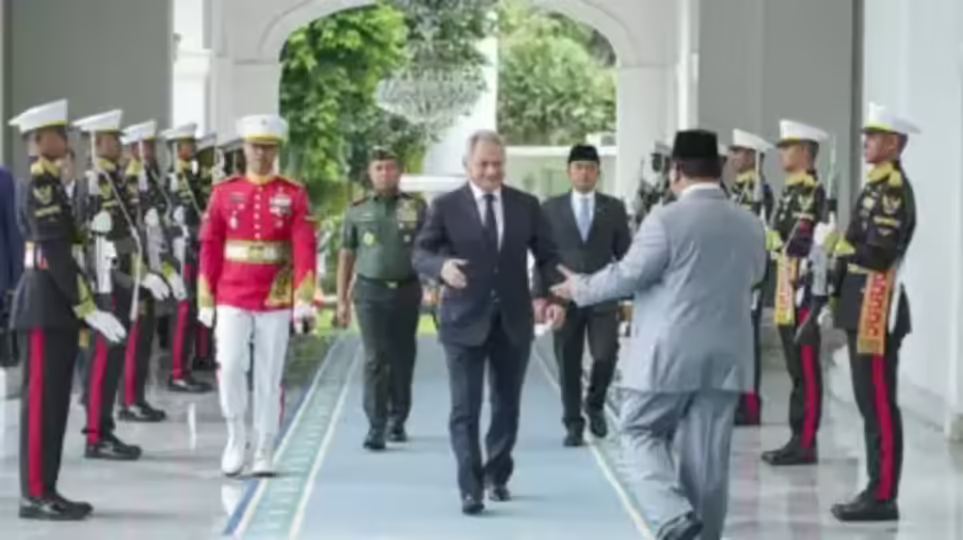Russia and Indonesia Forge Stronger Defense and Security Alliance Amid Global Tensions
Tue, 25 Feb 2025

Russia and Indonesia have engaged in high-level discussions in Jakarta. The meeting featured Sergei Shoigu, Secretary of the Russian Federation Security Council, and Indonesia's Defense Minister Sjafrie Sjamsoeddin. This dialogue underscores the deepening relationship between the two nations, especially in the context of Indonesia's recent induction as a full member of the BRICS group of emerging economies. Shoigu's visit to Jakarta marks the commencement of a five-day Asian tour, which also includes Malaysia. The primary agenda of these talks is to explore avenues for enhancing defense partnerships and to deliberate on other mutual interests. The discussions are particularly timely, as they occur against the backdrop of ongoing global geopolitical shifts and Russia's extended military engagement in Ukraine. Indonesia's accession to the BRICS bloc, comprising Brazil, Russia, India, China, and South Africa, signifies its growing influence in global economic and political arenas. This membership is anticipated to open new channels for economic collaboration and strategic partnerships, with defense and security being pivotal areas of focus. Historically, Indonesia has maintained a policy of non-alignment, striving to balance its international relations without favoring any particular bloc. However, recent developments indicate a strategic pivot towards strengthening ties with major powers, including Russia. This is evident from the joint naval exercises conducted by the Indonesian and Russian navies in the Java Sea. These exercises, the first of their kind, involved complex maneuvers and counter-terrorism drills, reflecting a mutual commitment to enhancing maritime security and operational interoperability. The defense relationship between the two countries is further exemplified by Indonesia's procurement of Russian military hardware. The Indonesian armed forces have integrated Russian-made equipment into their arsenal, including Sukhoi fighter jets and various armored vehicles. These acquisitions are part of Indonesia's broader strategy to modernize its military capabilities and diversify its defense partnerships. President Prabowo Subianto, who assumed office recently, has been a strong proponent of enhancing Indonesia's defense posture. His administration has articulated a vision of a robust and self-reliant military, capable of addressing both traditional and non-traditional security challenges. In pursuit of this goal, Indonesia has expressed interest in acquiring advanced weaponry, such as the BrahMos supersonic cruise missiles, developed jointly by Russia and India. Negotiations are reportedly in advanced stages, with discussions focusing on the potential procurement of these missile systems to bolster Indonesia's coastal defense capabilities. Despite its efforts to strengthen defense ties with Russia, Indonesia continues to uphold its neutral stance on international conflicts, including the situation in Ukraine. The Indonesian government has consistently advocated for peaceful resolutions through diplomatic means and has refrained from aligning with any party involved in the conflict. This approach aligns with Indonesia's long-standing foreign policy principle of "free and active" diplomacy, which emphasizes independence and proactive engagement in international affairs. The recent talks between Shoigu and Sjamsoeddin also encompassed discussions on broader security cooperation, including counter-terrorism, intelligence sharing, and cybersecurity. Both nations recognize the evolving nature of global security threats and the necessity of collaborative efforts to effectively address these challenges. In this context, the signing of an intergovernmental agreement on information security cooperation signifies a concrete step towards building a resilient and secure cyber infrastructure. As Indonesia embarks on its journey as a BRICS member, the deepening of defense and security ties with Russia is poised to play a crucial role in shaping its strategic landscape. This partnership not only enhances Indonesia's military capabilities but also positions it as a significant player in regional and global security dynamics. The ongoing collaboration reflects a shared commitment to peace, stability, and mutual prosperity in an increasingly complex world order.
